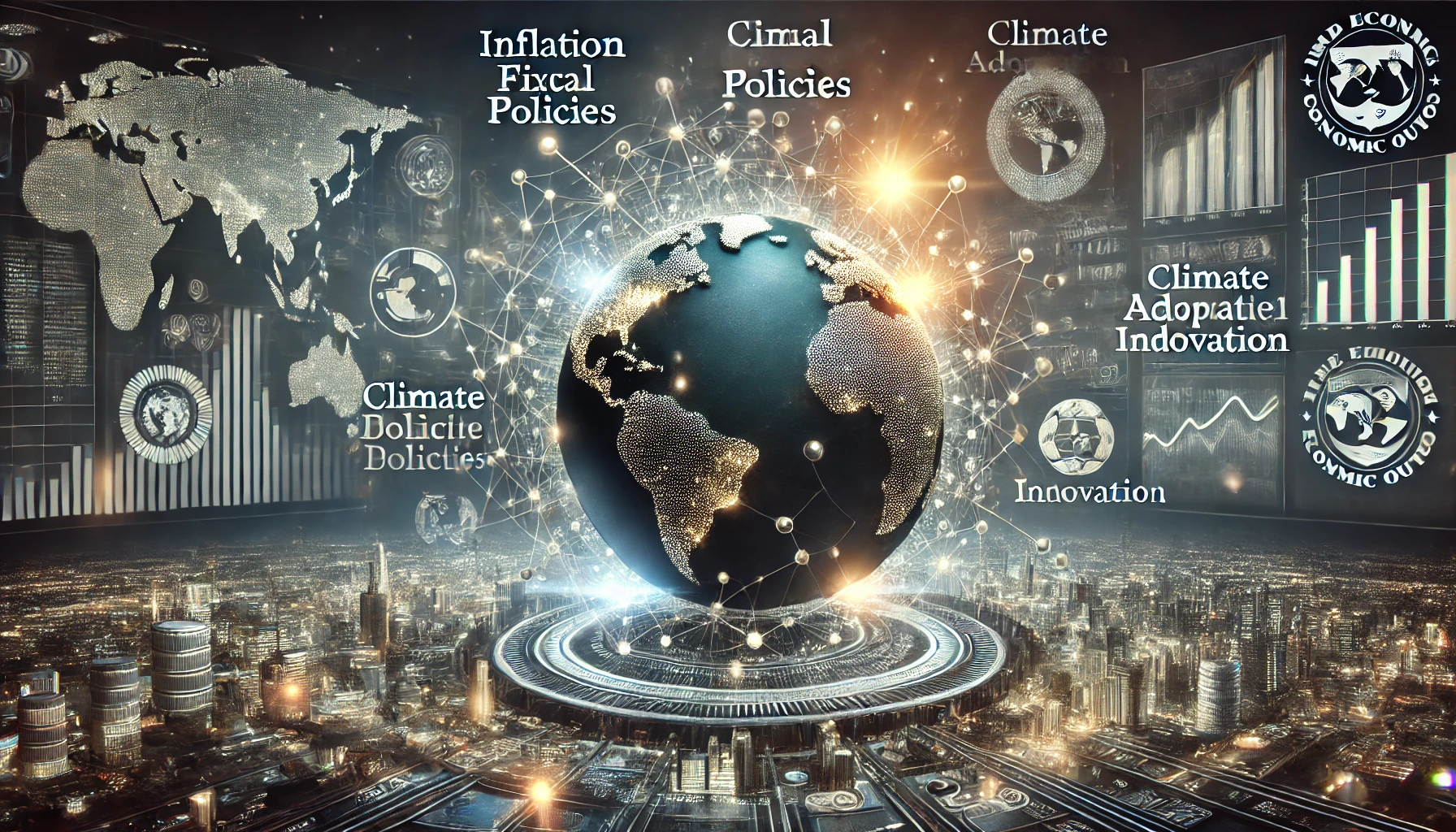Global Economy at a Crossroads: IMF Urges Action on Inflation, Debt, and Reforms
The IMF’s World Economic Outlook highlights moderate global growth amid challenges like inflation, geopolitical tensions, and high debt, urging coordinated global action and structural reforms for resilience and sustainability. It emphasizes climate adaptation, digital transformation, and inclusive policies to balance short-term recovery with long-term development.

The International Monetary Fund's (IMF) latest World Economic Outlook (WEO) presents a comprehensive assessment of global economic trends, challenges, and opportunities. The report, prepared by the IMF’s research team, highlights how persistent shocks, evolving policies, and structural transformations continue to shape economic dynamics worldwide. Against the backdrop of the lingering impacts of the COVID-19 pandemic and geopolitical disruptions, the global economy is expected to grow moderately in the coming years. Advanced economies are likely to experience decelerated growth due to tighter monetary policies aimed at controlling inflation while emerging markets are poised for stronger growth trajectories driven by domestic demand and structural reforms. Nevertheless, risks such as inflationary pressures, supply chain vulnerabilities, and geopolitical tensions remain central to the global economic outlook.
Inflation Challenges and the Central Bank Response
Inflation continues to dominate economic concerns, albeit with notable regional differences. Advanced economies are beginning to witness a gradual decline in inflation rates, thanks to aggressive monetary tightening. In contrast, many emerging markets face persistently high inflation, fueled by volatile commodity prices and supply chain disruptions. Central banks worldwide remain committed to containing inflation by tightening monetary policies, but this strategy comes with challenges. Striking a balance between controlling inflation and sustaining economic momentum is a delicate task, especially in regions where structural weaknesses amplify vulnerabilities. The burden of inflation has disproportionately affected lower-income households, underscoring the need for targeted fiscal measures to cushion its social and economic impacts.
Fiscal Policies Under Strain
The pandemic's aftermath has left governments grappling with heightened fiscal challenges, including the need to manage pandemic-era spending and address pressing social needs. Many economies, particularly low-income nations, are facing unsustainable debt levels, which constrain their ability to invest in critical sectors. The IMF emphasizes the urgency of global coordination to tackle debt sustainability issues, urging creditors and borrowers to collaborate on practical strategies. Multilateral institutions play a pivotal role in providing financial support and technical assistance to vulnerable economies. At the same time, fiscal policies must remain targeted and efficient, ensuring resources are directed to the most vulnerable populations while maintaining fiscal discipline.
Structural Reforms for a Sustainable Future
The IMF report strongly advocates for long-term structural reforms to build resilience and foster sustainable growth. One of its key recommendations is the urgent need for climate adaptation and investment in green technologies. The transition to renewable energy and climate-resilient infrastructure is not only a necessity for mitigating climate risks but also an economic opportunity to drive sustainable development. The report also highlights the importance of digital transformation, innovation, and skills development in addressing labor market disruptions caused by automation and demographic shifts. Countries that invest in these areas are better positioned to boost productivity and competitiveness in an increasingly interconnected and technology-driven global economy.
Geopolitical Risks and Regional Challenges
Geopolitical tensions remain a significant concern for global economic stability. The IMF’s analysis explores the far-reaching implications of conflicts and disruptions, including trade restrictions, energy market volatility, and shifts in global supply chains. The energy crisis in Europe, driven by the region’s reliance on traditional energy sources, has prompted a rapid shift toward renewables and alternative supply routes. Meanwhile, China’s economic slowdown and policy uncertainties have added another layer of complexity to the global economic outlook. The report also draws attention to the challenges faced by low- and middle-income countries in achieving sustainable development, emphasizing the need for international cooperation to address systemic inequalities and promote inclusive growth.
A Call for Coordinated Global Action
Throughout the report, the IMF stresses the interconnected nature of today’s economic challenges and the need for collective action. Policymakers are urged to prioritize strategies that balance short-term recovery with long-term resilience, focusing on inclusive and sustainable growth. Multilateral engagement is highlighted as critical to addressing global issues such as debt sustainability, trade imbalances, and climate change. The report emphasizes that coordinated global action is essential to maintaining stability in an increasingly fragmented world.
The IMF’s World Economic Outlook provides a detailed roadmap for navigating the complexities of the current global economic climate. It underscores the importance of resilience, innovation, and international cooperation in overcoming challenges and seizing opportunities. As economies adapt to evolving dynamics, the ability to implement forward-thinking and agile policies will determine their success in ensuring sustainable growth. The report ultimately calls for a balanced approach, recognizing that transformative changes are possible even in the face of uncertainty. By offering actionable insights and recommendations, the IMF highlights the path forward for policymakers, businesses, and global institutions as they confront the most pressing economic issues of our time.
- FIRST PUBLISHED IN:
- Devdiscourse
ALSO READ
Italy's U-turn on COVID-19 Fines: A Controversial Decision
Supreme Court Reviews Vaccine-Induced Deaths Amidst COVID-19 Crisis
ICMR Study Finds COVID-19 Vaccination Lowers Risk of Sudden Death in Young Adults
Italy's Economic Woes in the Wake of COVID-19: A Stark Contrast with Spain
China Urges Trump Administration for Renewed Collaboration Amid COVID-19 Strains









